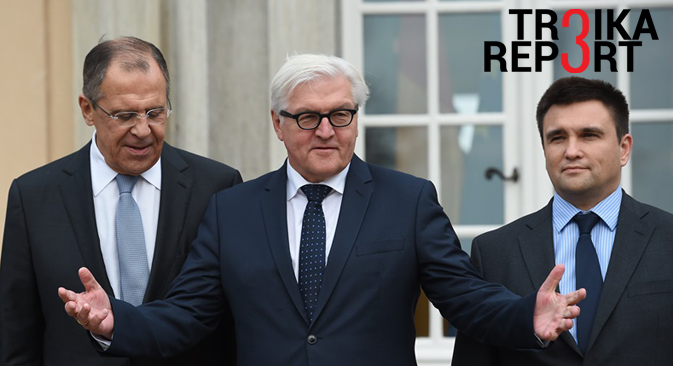
Russian Foreign Minister Sergey Lavrov, German Foreign Minister Frank-Walter Steinmeier and Ukrainian Foreign Minister Pavlo Klimkin, stand in front of the foreign ministry's guest house in Berlin, Nov. 6, 2015.
APThe latest meeting by the Russian, Ukrainian, French and German foreign ministers on diffusing the Ukrainian crisis, which took place in Berlin on Nov. 6, produced rather controversial results. Despite an upbeat assessment by German Foreign Minister Frank-Walter Steinmeier that the talks had “exceeded expectations,” it became evident that there was no chance whatsoever of finalizing the implementation of the Minsk agreements before the fixed deadline, the end of 2015.
On top of this disappointment came a strong statement by the European Union, laying the blame on Russia for the failure to implement in full the peace plan on resolving the conflict between government forces and Russian-backed rebels in eastern Ukraine. Consequently, Donald Tusk, the Polish politician who is now President of the European Council, made it clear that the economic sanctions against Russia will be once again prolonged after the end of the January deadline.
The provisional results of how both warring parties, the government in Kiev and the unrecognized rebel republics in eastern Ukraine, are moving forward in accordance with the letter and spirit of the Minsk agreements are largely disappointing. Nevertheless, the official statement by the German Ministry of Foreign Affairs has punctuated the consent of Kiev and the rebels, hammered out at the last meeting in Berlin, to adhere to the timeline for the withdrawal of heavy weaponry from the line of contact, as well as removing landmines throughout the Donbass region.
Meanwhile, despite the recent agreement made on holding elections in the mutinous republics of Donetsk and Lugansk, recent reports from eastern Ukraine do not bode well for complacency. Kiev and Donetsk-Lugansk are accusing each other of violating the ceasefire agreement. Kiev claims the rebels have been firing mortars at the entrenched government forces, while the rebels assert that the Ukrainian army has recommenced artillery shelling of civilian targets.
Amid confusing signals from the Donbass and the stuttering progress of peace negotiations, and with the European Union and the United States unwilling to relax sanctions against Russia, is there any indication of which direction things are likely to head in?
Sergei Markedonov, an associate professor at the Russian State University for the Humanities, provided his insight for Troika Report.
“First of all, the positive statements come as a surprise. The West has repeatedly stated that sanctions against Russia would be lifted only after a ‘breakthrough’ in the Minsk peace process is achieved. What qualifies as a breakthrough is mainly Kiev regaining control over the Ukrainian-Russian border and the re-incorporation of the Donbass into Ukraine. Unless this happens, there will be no cancelation of sanctions, either totally or even in part.
“As for Vladimir Putin and the Kremlin in general, I think they will want more concrete guarantees from Ukraine and the West that Kiev will not transform the country into a bastion and stronghold against Russia. In terms of control over the Ukrainian-Russian border, for Moscow this would be acceptable only after a comprehensive resolution of the conflict, just as it has been spelled out in the Minsk-2 agreement.”
- Let’s explore the EU’s tough stance on Russia. Modest progress on the ground within the mandate of Minsk-2 has apparently been achieved due to Moscow’s flexibility and persuasive power vis-a-vis the rebel republics of Donetsk and Lugansk, although they have an agenda of their own and inherent specific interests. Why is the EU reluctant to make a goodwill gesture, say, by lifting some of the sanctions? Such a move would meet the approval of the segments of European business hit by Moscow’s counter-sanctions.
“The European Union is not a single entity. It encompasses different policies towards Russia in the context of the Ukrainian crisis. But it abides by the rules of the union, which command discipline. This is presented as ‘solidarity.’”
“Then there is the external factor: The United States is playing a crucial role in the European security architecture. We have to take into account the position of the U.S. The U.S. is not ready to make serious compromises in respect to Russia, especially not on the eve of the presidential election campaign.”
Judging by this stern verdict, with the slow progress on the Minsk-2 peace roadmap and with the confrontation between the government in Kiev and the rebel republics in the east of the country still unresolved, it is challenging to identify an encouraging timeline for the abandonment of the war of sanctions and the restoration of a workable relationship between the European Union and Russia.
The opinion of the writer may not necessarily reflect the position of RBTH or its staff.
All rights reserved by Rossiyskaya Gazeta.
Subscribe
to our newsletter!
Get the week's best stories straight to your inbox